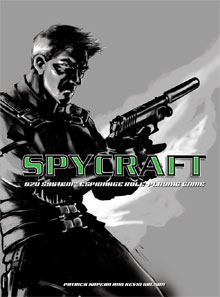 When I first saw the cover to Ninjas & Superspies, I knew I had to have it. This looked like the Totally-Not-G.I. Joe RPG I'd wanted for years, and it came from the people who made Teenage Mutant Ninja Turtles and Heroes Unlimited and I didn't know anyone who did Champions back then so Palladium was my jam.
When I first saw the cover to Ninjas & Superspies, I knew I had to have it. This looked like the Totally-Not-G.I. Joe RPG I'd wanted for years, and it came from the people who made Teenage Mutant Ninja Turtles and Heroes Unlimited and I didn't know anyone who did Champions back then so Palladium was my jam.
It was a mess. It still is a mess. Not because the rules were hard to grasp, even with the new Chi mechanic added, but rather due to cumbersome organization and unclear text in places. Once you figured out what the hell to do, the game itself was not that bad; you're an Operative for an Agency, and you go on Missions for the Agency to advance its agenda. The subsystem for creating your own Agencies would come back time and again in other Palladium products (at least three times in RIFTS alone) for various operative front organizations.
The actual play experience resembled those '80s G.I. Joe cartoons with ease, and with effort their comic counterparts. Remember that this was the '80s, and ninja were awesome. So were the classic '80s Action Films that Razorfist has an entire playlist extolling the virtues thereof. This game--late to the party and not entirely successful--tried to cash in on that sentiment, as filtered by men who were already adults at the time and made their bones in the comics and games of the '70s. This ain't John Wick. It ain't even John Woo. If you try hard, you can get close to Sam Peckinpah.
Which is why this is not one of Palladium's popular games. Not even an entire supplement--Mystic China--devoted to China's martial arts and related mythology did anything to make this anything but an also-ran that sometimes gets mined for use with other games the company publishes. The execution, for many gamers, lacked enough to prompt them to choose a competitor instead. It would be a while before someone tried this concept again and hit.
 Alderac Entertainment Group would make that happen in the early days of the d20 System with the first big breakout from the intended paradigm that Wizards of the Coast planned around: Spycraft. This was the first proof of concept that you could take the same game engine as Dungeons & Dragons, change only one major subsystem (Hit Points), and get something entirely capable of cleanly and quickly playing the same sort of thing that Ninjas & Superspies did in such an unwieldy manner over a decade before.
Alderac Entertainment Group would make that happen in the early days of the d20 System with the first big breakout from the intended paradigm that Wizards of the Coast planned around: Spycraft. This was the first proof of concept that you could take the same game engine as Dungeons & Dragons, change only one major subsystem (Hit Points), and get something entirely capable of cleanly and quickly playing the same sort of thing that Ninjas & Superspies did in such an unwieldy manner over a decade before.
The cost was that, being a game made during the Rise of the Mech Pilots, much of what was useful content got parsed out over many supplements- and some of them were part of the house setting (Shadowforce Archer) instead of the main product line. By the time that the 1st edition ended its publication run, things got very unwieldy- especially for the Pilots. By the time that the second edition got rolling, the zeitgeist moved on and the game joined its Palladium predecessor on the shelf.
This seems to be the general fate of this genre in tabletop gaming. There's been plenty of discussion (and ranting) about the whys over the years, but--apart from the general lack of powers in most characters--the big one is the lack of anarchy; players, by and large, prefer to be free agents and most games in this genre have you as a literal agent for a literal agency, complete with Chain of Command and the regulations that come with it. Not even the success of the Fast & Furious franchise changes this, nor that of other films featuring ensemble casts the size of a typical tabletop RPG party (e.g. Expendables).
This is unfortunate. The tabletop RPG medium is, fundamentally, a medium of practical imagination. Practical due to its roots in wargaming. Imagination due to all of the fantastic environments, circumstances, and characters inhabiting them for you to (virtually) experience. Maybe a new Top Secret edition will shake things loose, but I've been around too long to hold out hope. The post-1980 shake-up in SF/F lead to a narrowing of vision and possibility well outside the houses of New York and London, and did so within a decade. These two games are casualties of that degradation of the culture.
No comments:
Post a Comment
Anonymous comments are banned. Pick a name, and "Unknown" (et. al.) doesn't count.